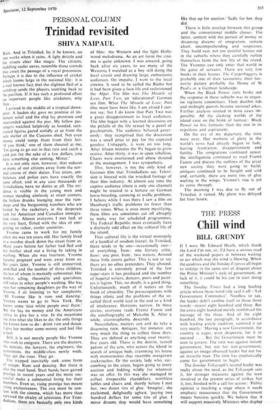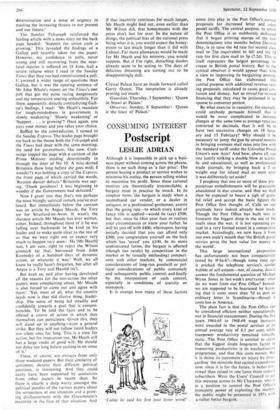THE PRESS
Chill wind
BILL GRUNDY
If I were Mr Edward Heath, which thank the Lord I'm not, sir, I'd have a serious read of the weekend papers in between waiting to see which way the wind is blowing. When the qualities and the Sunday Express all begin to indulge in the same sort of disquiet about the Prime Minister's style of government, or lack of it, it could be his cue to start doing something.
The Sunday Times had a long leading article whose three-word title said it all—'Let Government Commence'. Needless to say, the leader didn't confine itself to those three words—nearer eight hundred and three. But the extra eight hundred merely reinfcirced the message of the three. And of the eight hundred, the last paragraph, in accordance with leading article tradition, summed it up very neatly: 'Having a new Government, the country is eager, even desperate, for it to succeed - . . But the Government must be seen to govern. The vote was against instant government, but not for non-government; against an image-obsessed leader but not for an invisible man. The time has emphatically come for government to begin.'
The Sunday Telegraph's second leader was really about the need, as the Telegraph sees it, for stronger measures against the men involved in the present series of strikes, but it, too, finished with a call for action: 'Public opinion is reaching a stage where it needs emphatic reassurance that the Government means business quickly. We believe that it will support massively Ministers who display
determination and a sense of urgency in meeting the increasing threats to our present and our future.'
The Sunday Telegraph reinforced the leading article with a news story on the back page headed: 'Support for union curb is growing.' This revealed the findings of a Gallup poll recently taken for the paper. However, my confidence in polls, never strong and still recovering from the near- fatal injuries it suffered on 18 June, had a severe relapse when I read in the Sunday Times that they too had commissioned a poll. It covered a wider range of questions than Gallup, but it was the opening sentence of Mr John Whale's report on the Times's ORC poll that got my pulse racing dangerously and my temperature soaring unhealthily. For there, apparently, directly contradicting Gall- up's findings, I read: `Mr Heath's mandate for tough-mindedness in government is slowly weakening.' Slowly weakening' or 'Support . . . is growing'? Once again, you pays your money and you takes your choice.
Baffled by the contradiction, I turned to the Sunday Express. The leader page brought me back to the theme both the Telegraph and the Times had dealt with the same morning, the need for government; like now. Cum- mings topped the page with a cartoon of the Prime Minister striding determinedly in through the door of No 10. A mini-skirted Britannia (how long before she goes midi, I wonder?) was holding a copy of the Express, the front page of which carried the words, 'Russian dancer defects.' Britannia was say- ing, 'Thank goodness! I was beginning to wonder if the Government had defected.'
Now I grant you that that's not perhaps the most bitingly satirical remark you've ever heard. But immediately below the cartoon was an article by Angus Maude, the Tory MP for Stratford-on-Avon. It wasn't the sharpest article Mr Maude has ever written, either. Indeed, throughout most of it he was falling over backwards to be kind to his leader and to make quite clear to the rest of us that we were right not to expect very much to happen very soon: 'He [Mr Heath] was, I am sure, right to reject the Wilson gimmick (at that, borrowed from John Kennedy) of a hundred days of dynamic action, or whatevEr it was.' Well, we all know he really hasn't forgotten, but after all Angus is a Tory and Harold isn't.
But even so, and after having developed all the reasons for the non-action the other papers were complaining about, Mr Maude is also forced to come out and agree with them: 'Yet, most of all, what the country needs now is that old elusive thing, leader- ship. The sense of being led steadily and confidently towards a goal that is compre- hensible. To be told the facts and to be offered a course of action in which they themselves can participate. Given this, they will stand up to anything—even a general strike. But they will not follow timid leaders nor silent ones for long. This is a time for action, but for inspiration too. Mr Heath still has a large credit of good will. He should not delay too long before cashing in on some of it: These, of course, are- extracts from only three weekend papers. But their similarity of sentiment, despite their different political positions, is interesting. And they could easily have been supported by quotations from other papers in recent days. So there is clearly a deep worry amongst the political pundits of the various papers about the seriousness of our situation and a grow- ing disillusionment with the Government's inactivity in the face of that situation. And if that inactivity continues for much longer, Mr Heath might find out, even earlier than Mr Wilson did, that honeymoons with the press don't last for ever. In the nature of things, the political bias of the national press being what it is, you would expect the honey- moon to last much longer than it did with Labour. Far more allowances would be made for Mr Heath and his ministry, you would suppose. But if I'm right, disturbing doubts already seem to be setting in. The days of delicious dreaming are turning out to be disappointingly dull.
Crystal Palace have an inside forward called Gerry Queen. The temptation is already proving too much:
Guardian, Thursday, 3 September:. 'Queen in brawl at Palace.'
Observer, Sunday, 6 September: 'Queen is the toast of Palace.'















































 Previous page
Previous page